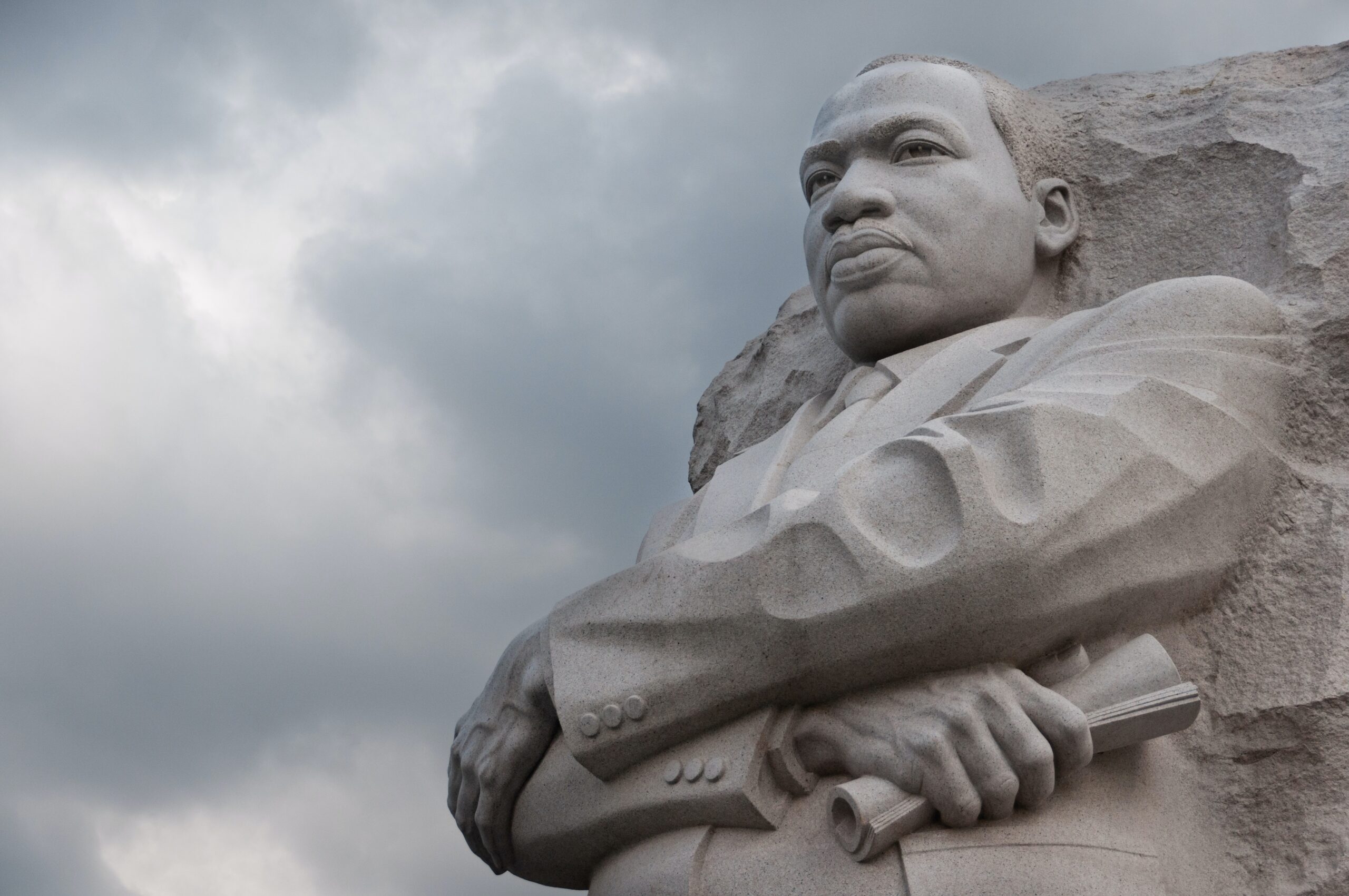
University of Michigan
Rev. Dr. Martin Luther King, Jr. Symposium
2025
Restless Dissatisfaction: An Urgent Call for the Pursuit of Justice and Equality
MLK Keynote Lecture
January 20, 2025 | 9:30 to 11 am
Hill Auditorium
This event is FREE and OPEN to the public. No registration required.
View the live stream below
39th Annual Keynote Memorial Lecture featuring a moderated discussion with Erika Alexander
Erika Alexander is an actress, trailblazing activist, entrepreneur, creator, producer, director and one of the country’s boldest, most daring, and powerful voices. Recognizing the power of storytelling, Erika believes that though content must be entertaining, stories have tremendous capacity to create impact and meaningful social change. As co-founder of Color Farm Media, she is on a mission to bring greater equity, inclusion, and diverse representation to both media and electoral politics.
She is also creator/writer/producer of 2022 Audible Original’s Best True Crime Series and DuPont Columbia award-nominee, FINDING TAMIKA, and producer of the three-time, Emmy-nominated Best Documentary and winner, NAACP Best Documentary, JOHN LEWIS: GOOD TROUBLE.
A critical thought leader on racial and gender equity and leadership, she serves as a board member for One Fair Wage and is highly involved with social and racial justice organizations including The Poor People's Campaign, Color of Change, NAACP, UNCF, among others.

theme statement
In his speech accepting the Nobel Peace Prize in 1964, Dr. Martin Luther King, Jr. stated:
"We’ve been in the mountain of war. We’ve been in the mountain of violence. We’ve been in the mountain of hatred long enough. It is necessary to move on now, but only by moving out of this mountain can we move to the promised land of justice and brotherhood and the Kingdom of God. It all boils down to the fact that we must never allow ourselves to become satisfied with unattained goals.
We must always maintain a kind of divine discontent.”
Martin Luther King Jr.'s concept of "divine discontent" serves as a profound and enduring call to action for individuals and society. In an era characterized by rapid technological advancements, social upheavals, and environmental challenges, the concept of "divine discontent" emerges as a pivotal force driving progress and innovation.
Theodore Roosevelt described divine discontent as a “fierce discontent.” At the same time, consultant Tim Robson calls it an otherworldly dissatisfaction, while many equate it to a “restless dissatisfaction,” unlike mere discontent or frustration, which is a constructive and proactive force. It embodies a relentless drive to push beyond existing boundaries, challenge the status quo, and envision a better future.
The concept of "restless dissatisfaction" is central to Dr. King’s message in this speech and many others where he used the term. Restless dissatisfaction encourages a relentless pursuit of improvement and justice. This dissatisfaction is not about negativity or cynicism; instead, it is about a positive, driving force that continuously compels individuals and societies to strive for a better and more just world. It is this persistent urge to achieve unattained goals that propel progress.
King's emphasis on restless dissatisfaction is rooted in the belief that complacency is the enemy of progress. He recognized that without a persistent and active discontent with injustice, there would be no impetus for change. This discontent is "divine" because it aligns with a higher moral and ethical calling. It is not simply about being unhappy or critical but about recognizing the gap between the current reality and the ideal vision of justice and equality. This recognition compels individuals to take action, challenge existing structures, and work tirelessly for a better world.
In his speeches and writings, King often highlighted the moral responsibility of individuals to maintain this restless dissatisfaction. He argued that it is essential for fostering social change and achieving civil rights; it is a moral awakening that leads people to confront the injustices around them. Dr. King’s own life was a testament to this principle, as he continually pushed for progress despite facing immense challenges and opposition.
Moreover, Dr. King’s call for restless dissatisfaction extends beyond racial justice to encompass all forms of social and economic inequality. He believed that true justice could only be achieved when individuals perpetually strive to close the gap between the world as it is and the world as it should be. This discontent must be directed towards systemic issues such as poverty, unemployment, and inadequate education. By addressing these broader issues, King’s vision of divine discontent becomes a universal call for comprehensive social reform and human rights.
In his speech “Where Do We Go from Here,” delivered at the SCLC Convention in 1967, Dr. King urged:
“And so, I conclude by saying today that we have a task and let us go out with a divine dissatisfaction.
Let us be dissatisfied until America no longer have a high blood pressure of creeds and an anemia of deeds.
Let us be dissatisfied until the tragic walls that separate the outer city of wealth and comfort from the inner city of poverty and despair shall be crushed by the battering rams of the forces of justice.
Let us be dissatisfied until those who live on the outskirts of hope are brought into the metropolis of daily security.
Let us be dissatisfied until slums are cast into the junk heaps of history and every family will live in a decent, sanitary home.
Let us be dissatisfied until the dark yesterdays of segregated schools will be transformed into bright tomorrows of quality integrated education.
Let us be dissatisfied until integration is not seen as a problem but as an opportunity to participate in the beauty of diversity.
Let us be dissatisfied until men and women, however black they may be, will be judged on the basis of the content of their character, not on the basis of the color of their skin.
Let us be dissatisfied.
Let us be dissatisfied until every state capitol will be housed by a governor who will do justly, who will love mercy, and who will walk humbly with his God.
Let us be dissatisfied until from every city hall, justice will roll down like waters, and righteousness like a mighty stream.
Let us be dissatisfied until that day when the lion and the lamb shall lie down together, and every man will sit under his own vine and fig tree, and none shall be afraid.
Let us be dissatisfied, and men will recognize that out of one blood God made all men to dwell upon the face of the earth.
Let us be dissatisfied until that day when nobody will shout, "White Power!" when nobody will shout, "Black Power!" but everybody will talk about God's power and human power.”
This year, we celebrate MLK Day on the same day as the inauguration of the president of the United States. No doubt, many will be dissatisfied no matter who wins. We urge everyone to examine the origins of your discontent to ensure that you are driven by the call for justice and a better tomorrow.
Dr. King’s call for divine discontent or restless dissatisfaction is a powerful and enduring message encouraging individuals and society to never settle for less than true justice and equality. Are you settling for less?
Dr. King’s message is a call to continuously recognize and challenge the injustices in our world. Are you challenging injustices?
Dr. King’s divine discontent is about maintaining a righteous dissatisfaction with the status quo and working tirelessly to bridge the gap between reality and our highest ideals. Are you fighting the status quo in pursuit of high ideals?
By embracing this form of discontent and dissatisfaction, we honor King’s legacy and contribute to the ongoing struggle for a just and equitable society. So today, we urge that you remain dissatisfied until the goals of justice and equality are met.

